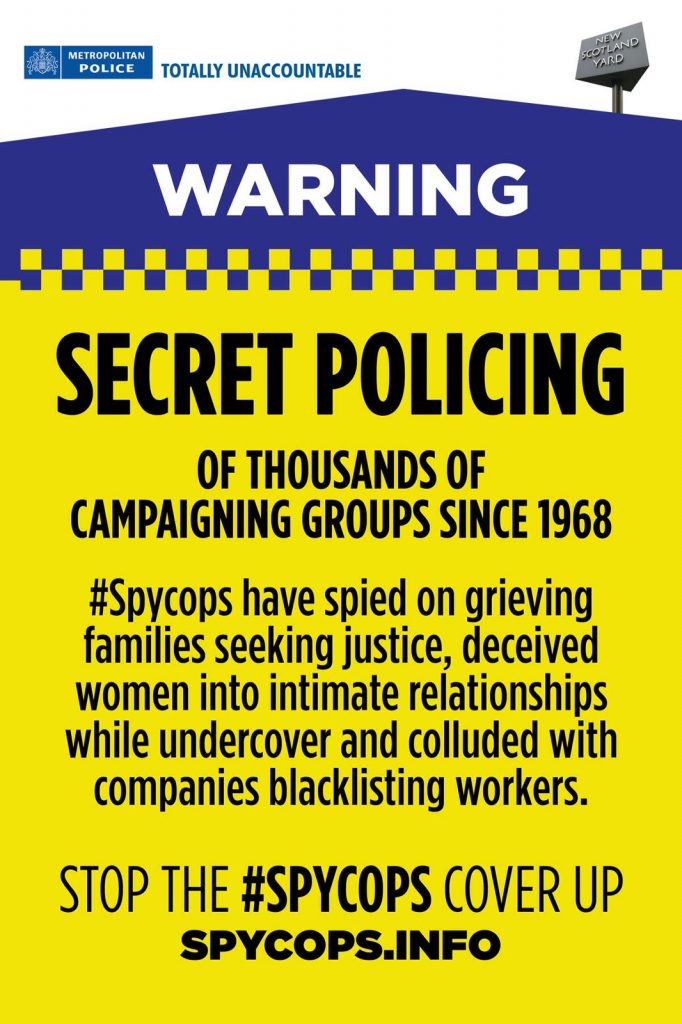
Background
The Undercover Policing Inquiry was announced by then Home Secretary Theresa May in March 2015, and began in July of that year. Initially led by Lord Pitchford, the Inquiry is currently chaired by former judge John Mitting. Following significant delays, evidence is now due to start to be heard in 2020 with a current reporting date of 2023.
Evidence is emerging that thousands of people have been reported on by these undercover units and the current delay is due to issues relating to data protection. This database shows the names of groups infiltrated and by whom, where the names of undercover officers are known. We urge people to familiarise themselves with these names and groups in order to establish the scale of political policing.
The inquiry, which will be holding hearings, has asked that anyone wishing to provide evidence to get in touch. It has designated many of those who know they were affected as ‘core participants‘, enabling their legal representation within the Inquiry. Further core participants may be added as the inquiry proceeds.
Want to read more?
Our blog posts will keep you up to date with major developments and general scrutiny of the Inquiry, and we also recommend further reading at the Campaign Opposing Police Surveillance and the Undercover Research Group.
We have published briefings & reports on the inquiries activity so far.
What we are asking for
Our current priorities are to ensure the Inquiry is open, transparent and robust. We do not feel the Inquiry chair, Sir John Mitting, is suitable to lead this process on his own and we are campaigning for the Home Secretary to appoint a panel with expertise, knowledge and understanding of institutional sexism and other forms of discrimination.
We have been campaigning for the Inquiry to be extended to include the activities of undercover officers abroad, and the links between undercover policing and corporate spying.
We need the Inquiry to release the cover names of the undercover groups, release the names of the campaign groups that were targeted, and to open the files held on targeted people.
In the lead up to the Inquiry, we called for the police to ‘Come Clean’ over undercover policing and the host of abuses committed by the various units, some of which may be continuing. See the petition here. The women submitted to Pitchford – the original judge – their desired terms of reference for the Inquiry.
Our core statement, Where We Stand, makes clear why we must give the inquiry our full attention: “the women affected and their many supporters … call for the past to be thoroughly and openly investigated, so that the damage may be acknowledged, those responsible may be held to account, and that as a society we may come to terms with what has happened, heal the wounds that have been inflicted and be confident that the practice [of undercover relationships] has ceased”. The institutional sexism and abuse of human rights shown by the relationships must be challenged.
Current concerns over the inquiry and relationships:
Listed below are the current concerns over the inquiry which relate both to the relationships that are known to have taken place and to the concerns that relationships may still be happening.
– many don’t know they were affected: cover names should be released
Currently only those who know they were affected by undercover police deployments are able to apply to the inquiry to be core participants. The women who know that their ex-partners were officers believe that there may be many other women affected. Only if the cover names are released can those women (and maybe men) come forward.
more info > release the names, Jan 2016; letter from core participants Feb 2016
– restriction to England and Wales: inquiry should be widened
Several of those who know that they had relationships with undercover officers have joined calls for the inquiry to be widened beyond England and Wales. They report having travelled with the officers themselves; they are also concerned about further relationships and the women affected.
more info > COPS: Pitchford Inquiry’s geographical blinkers
– officers may be destroying files: files must be protected and opened
In January 2016 a whistleblower came forward to describe files being destroyed in relation to Jenny Jones, who is responsible for scrutiny of the Met police. It is believed that police have ongoing access to files and may be in a position to destroy evidence; this would include evidence as to who knew what about relationships, as well as all the other abuses committed by the units. Protection of files, and the opening of the files to those affected, has precedence – parallels have been drawn with the Stasi secret police files. Meanwhile the Undercover Research Group has called for the current political policing unit to be closed, to suspend officers’ access to the files.
more info > Women say ‘open the files’ / COPS: whistleblower re files / URG: Met must suspend unit
– the police are unwilling to come clean: Neither Confirm Nor Deny must be scrapped, Whistleblowers must be protected
The police are showing no signs of dropping their self-imposed policy of Neither Confirm Nor Deny (NCND) over undercover policing, despite it having no legal basis. NCND formed the key tactics for four years of delays inflicted by the police on women taking legal action against them over undercover relationships, and it seems likely that this contempt for the legal system will extend to the inquiry – if it is permitted to. Whistleblowers, some of whom were able to confirm the identities of officers who had relationships, must be protected if we are to find out who was responsible for the abuses. So far, those who have come forward have been threatened with prosecution under the official secrets act; the inquiry must offer them protection.
more info > NCND / Whistleblower threatened / Come Clean petition calls for whistleblower protection

